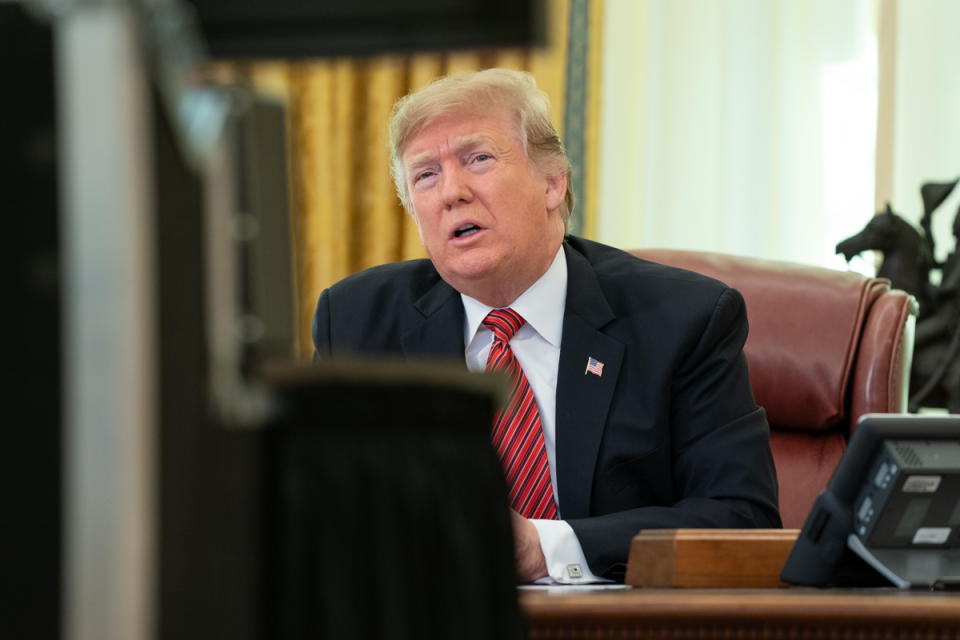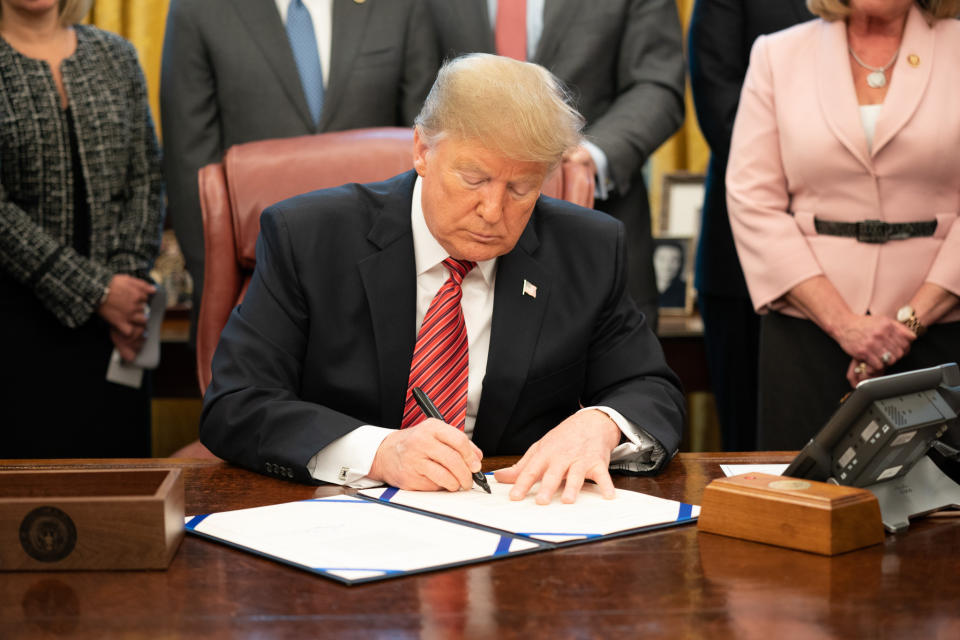Trump Continues to Flip-Flop on Medical Marijuana
The North American marijuana industry has had an incredible run over the past couple of years. In 2017, Mexico wound up legalizing medical marijuana, while in October 2018, Canada ended nine decades of adult-use prohibition and became only the second country worldwide to have given the green light to recreational weed. Within the U.S., two-thirds of all states have also legalized cannabis in some capacity, with 10 allowing adult consumption.
We've also witnessed a major shift in how the public views pot. Back in 1995, the year before California became the first U.S. state to wave the green flag on medical marijuana, a mere 25% of respondents in Gallup's survey favored nationwide legalization. Comparatively, an all-time record two out of three Americans polled favored legalization in Gallup's October 2018 survey.
It would seem that the tide has shifted for cannabis throughout North America, but that's not necessarily the case for President Donald Trump.

President Trump on a video conference from the Oval Office. Official White House Photo by Shealah Craighead.
President Trump keeps flip-flopping on medical pot
For those who may not recall, Trump was in full support of medical cannabis when questioned about the topic during 2016 presidential debates. He was quoted as saying that he was "100 percent" in favor of medical marijuana in the U.S. but opined that he'd need to see additional data before considering recreational weed for broad-based reform. However, this view from the president has undergone multiple transformations since 2016.
For instance, not long after being elected president, Trump appointed Jeff Sessions to become his attorney general (Sessions resigned in November 2018). Trump was fully aware of Sessions' leanings, which included an ardent stance against the proliferation of cannabis in any form. In fact, Sessions attempted to persuade a few of his congressional colleagues to repeal the Rohrabacher-Farr Amendment in 2017. This rider (also known as Rohrabacher-Blumenauer) has been attached to all federal spending bills since 2014, and it's designed to disallow the Justice Department from utilizing federal money to prosecute medical pot businesses operating in legal states. Needless to say, Sessions' attempts to repeal this rider failed.
Sessions was also responsible for rescinding the Cole memo on Jan. 4, 2018. The Cole memo, written by former Deputy Attorney General James Cole under the Obama administration, outlined a series of "rules" that legalized-weed states would need to follow in order to keep the federal government off their backs, so to speak. This included keeping marijuana away from children, as well as keeping cannabis grown in a legal state within that state's borders. At no point did President Trump intervene or speak out against Sessions' attempts to subvert the legal weed industry.
Also in 2017, Israel had revealed plans to grow medical cannabis and (hopefully) export this weed to the United States. However, Israeli officials cancelled these plans after President Trump soured on the idea.
Then, in April 2018, Trump reversed course and once again supported the idea of states' rights -- i.e., the idea that states have the right to legalize marijuana in some capacity and regulate their own industry. This support came at a time when Sen. Cory Gardner, R-Co., was attempting to garner support for banking reform in the cannabis industry.

President Trump signing a bill at his desk in the Oval Office. Image source: Official White House Photo by Shealah Craighead.
Trump changes his tune once again
This past week, Trump offered conflicting support yet again.
According to online publication Marijuana Moment, Trump used a signing statement following the passage of a Justice Department spending bill on Friday, Feb. 15, implying that his support for medical marijuana and states' rights isn't as strong as you might think.
The bill signed by the president, as with other previous spending bills, contained a rider that disallowed the Justice Department from using federal dollars to interfere with state medical marijuana laws. However, Trump's signing statement read as follows, courtesy of Marijuana Moment:
Division C, section 537, provides that the Department of Justice may not use any funds to prevent implementation of medical marijuana laws by various States and territories. I will treat this provision consistent with the President's constitutional responsibility to faithfully execute the laws of the United States.
In plain English, this signing statement leaves open the possibility that Trump will use his executive authority to not honor states' rights and allow the federal government to impose federal law. As a reminder, marijuana is a Schedule I drug at the federal level, which means it's entirely illegal, prone to abuse, and not recognized as having any medical benefits. Although this isn't the first time that Trump has used a signing statement with a bill he's signed, and he hasn't imposed federal law on legal states before, it demonstrates just how tenuous the president's support remains for medical marijuana.

Image source: Getty Images.
Change may be brewing from within
However, even with Trump seemingly wavering on medical cannabis, we're witnessing plenty of calls for change from within. For example, a Quinnipiac University poll from April 2018 found that 93% of respondents favored the idea of having physicians prescribe medical cannabis. Even though marijuana isn't a polarizing enough issue yet for politicians to lose their seats on Capitol Hill, this could change in the years that lie ahead.
We're also seeing the first signs of reform in Washington. On Feb. 13, the House Financial Services Committee held discussions on cannabis banking reform that's expected to lead to the first independent cannabis banking legislation at some point this year. Marijuana enthusiasts view weed banking reform as the first step toward overall legalization at the federal level.
But perhaps the biggest victory for the legal marijuana industry was the Food and Drug Administration's approval of GW Pharmaceuticals' (NASDAQ: GWPH) Epidiolex in June 2018. GW Pharmaceuticals' cannabis-derived lead drug dazzled in multiple late-stage trials, in which it led to a statistically significant improvement in seizure frequency reduction relative to baseline and a placebo drug for two rare types of childhood-onset epilepsy. This approval for GW Pharmaceuticals creates a cannabis conundrum that the federal government, Food and Drug Administration, and U.S. Drug Enforcement Agency have yet to deal with. Namely, it demonstrated that cannabis-derived drugs can have medical benefits, which is in stark contrast to the definition of a Schedule I drug.
Even with Trump's mixed signals, the U.S. medical cannabis industry looks poised for expansion at some point in the future. The question is, will Trump stand in its way?
More From The Motley Fool
Sean Williams has no position in any of the stocks mentioned. The Motley Fool has no position in any of the stocks mentioned. The Motley Fool has a disclosure policy.
